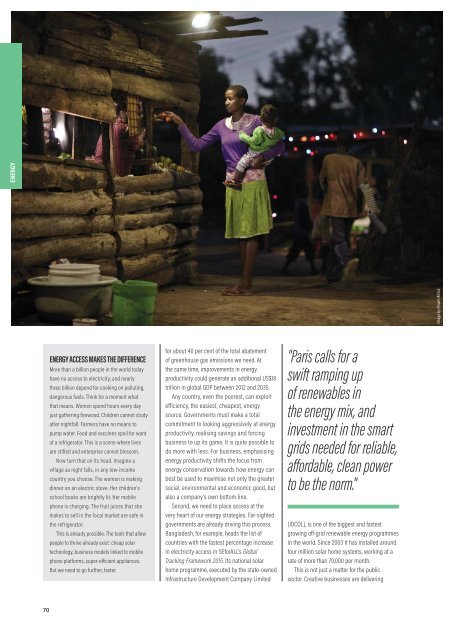Climate Action 2016-2017
Create successful ePaper yourself
Turn your PDF publications into a flip-book with our unique Google optimized e-Paper software.
Image by Power Africa<br />
ENERGY<br />
ENERGY ACCESS MAKES THE DIFFERENCE<br />
More than a billion people in the world today<br />
have no access to electricity, and nearly<br />
three billion depend for cooking on polluting,<br />
dangerous fuels. Think for a moment what<br />
that means. Women spend hours every day<br />
just gathering firewood. Children cannot study<br />
after nightfall. Farmers have no means to<br />
pump water. Food and vaccines spoil for want<br />
of a refrigerator. This is a scene where lives<br />
are stifled and enterprise cannot blossom.<br />
Now turn that on its head. Imagine a<br />
village as night falls, in any low-income<br />
country you choose. The woman is making<br />
dinner on an electric stove. Her children’s<br />
school books are brightly lit. Her mobile<br />
phone is charging. The fruit juices that she<br />
makes to sell in the local market are safe in<br />
the refrigerator.<br />
This is already possible. The tools that allow<br />
people to thrive already exist: cheap solar<br />
technology, business models linked to mobile<br />
phone platforms, super-efficient appliances.<br />
But we need to go further, faster.<br />
for about 40 per cent of the total abatement<br />
of greenhouse gas emissions we need. At<br />
the same time, improvements in energy<br />
productivity could generate an additional US$18<br />
trillion in global GDP between 2012 and 2035.<br />
Any country, even the poorest, can exploit<br />
efficiency, the easiest, cheapest, energy<br />
source. Governments must make a total<br />
commitment to looking aggressively at energy<br />
productivity, realising savings and forcing<br />
business to up its game. It is quite possible to<br />
do more with less. For business, emphasising<br />
energy productivity shifts the focus from<br />
energy conservation towards how energy can<br />
best be used to maximise not only the greater<br />
social, environmental and economic good, but<br />
also a company’s own bottom line.<br />
Second, we need to place access at the<br />
very heart of our energy strategies. Far-sighted<br />
governments are already driving this process.<br />
Bangladesh, for example, heads the list of<br />
countries with the fastest percentage increase<br />
in electricity access in SEforALL’s Global<br />
Tracking Framework 2015. Its national solar<br />
home programme, executed by the state-owned<br />
Infrastructure Development Company Limited<br />
"Paris calls for a<br />
swift ramping up<br />
of renewables in<br />
the energy mix, and<br />
investment in the smart<br />
grids needed for reliable,<br />
affordable, clean power<br />
to be the norm."<br />
(IDCOL), is one of the biggest and fastest<br />
growing off-grid renewable energy programmes<br />
in the world. Since 2003 it has installed around<br />
four million solar home systems, working at a<br />
rate of more than 70,000 per month.<br />
This is not just a matter for the public<br />
sector. Creative businesses are delivering<br />
70












